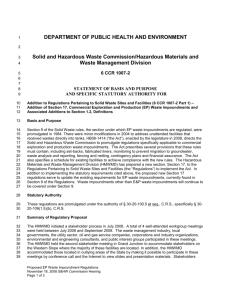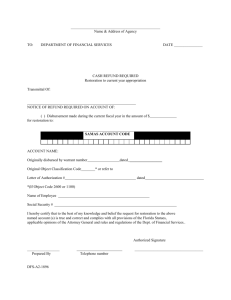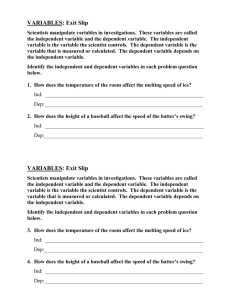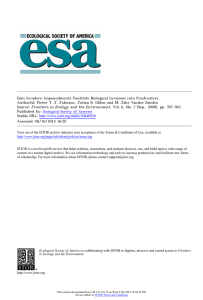TAB 6 26 14 subchapterCcomments
advertisement
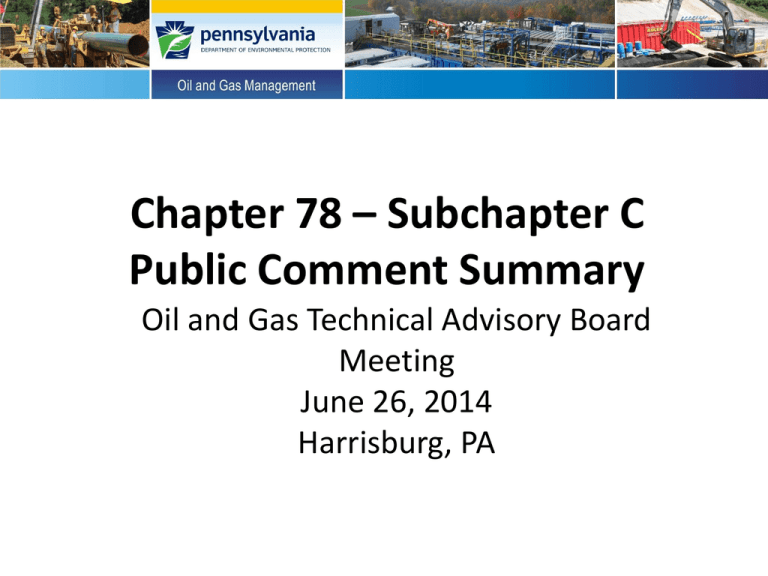
Chapter 78 – Subchapter C Public Comment Summary Oil and Gas Technical Advisory Board Meeting June 26, 2014 Harrisburg, PA Public Participation Process • • • • Draft regulation published December 2013 90-day public comment period Nine public hearings Department Received – Around 25,000 letters, emails, petitions, etc. – 1,200-1,500 unique comments – Around 22,000 form letters, petition signatures General Comments • Extend the public comment period and schedule more public hearings. • Create separate regulations for conventional and unconventional activities. • Improper/inaccurate financial analysis for conventional operations. 78.1 Definitions • Clarify, Expand or Modify the definitions for: – Centralized Impoundment – Conventional Formation – Conventional Well – Gathering Pipeline – Mine Influenced Water – Oil and Gas Operations – Regulated Substance 78.1 Definitions • Include definitions for: – Approximate Original Conditions – Freshwater – Occupied Dwelling 78.15 Application Requirements • The permit applicant, not DEP, should be responsible for determining whether proposed activities would affect T&E species. • DEP should respond to public comments received about a permit that may impact a public resource. 78.15 Application Requirements • The term ‘critical community’ as used in the oil and gas act is not the same as ‘special concern species’ and the two shouldn’t be equated as they are in the proposed regulations. • Increase the setbacks for new wells near publically owned park, forest, game land or wildlife area. 78.15 Application Requirements • 78.15(c) should be clarified to indicate what information must be provided regarding parent and subsidiary business entities. • There should be no drilling on state or federal lands. 78.51 Protection of Water Supplies • Operators should be required to restore contaminated drinking water to a quality that meets SDWA standards regardless of the quality of the water supply prior to contamination unless the quality of the water was better than SDWA standards, then the operator should be required to restore the water supply to the higher standard. 78.51 Protection of Water Supplies • Operators should be required to restore water supplies that they impact but should not be tasked with addressing water supply contamination unrelated to oil and gas activities. 78.52 Predrilling or Prealteration Survey • All operators should use a consistent and comprehensive list of parameters for pre-drill water testing, which DEP must establish before the proposed regulatory changes are adopted. • All pre-drill data should be made available to the public through an online platform while maintaining homeowners’ privacy. 78.52a Abandoned and Orphan Well Identification • Issues with type and scope of investigation • Issues with timing of investigation • Issues with post-investigation action level • Wells that are identified by operators should be mapped on a publicly available web platform. 78.56 Temporary Storage • Open pits should be prohibited for storing regulated substances. • Clarify the design approval process for modular above ground storage facilities. • Use of closed loop fluid management systems should be required. • Minimum liner thickness should be dependent upon pit depth. 78.56 Temporary Storage • Certification of pit liners should be required. • Pit liners should be required to cover freeboard. • The new requirements for pit side slopes will unnecessarily increase site disturbance and cost. 78.57 Control and Disposal of Production Fluids • Concerns over prohibiting open top structures – Pits are open top structures so they should not be allowed for production fluid storage. – 78.57(a) could be interpreted to exclude the use of centralized impoundments so clarify the intent of the subsection. • Replacing buried or partially buried tanks for production fluid is unnecessary and very costly. 78.58 Onsite Processing • Prohibit onsite processing of shale cuttings, produced water and other substances related to oil and gas operations which often contain hazardous substances and radioactive materials which require thorough analysis and special handling. 78.59(a, b and c) Centralized Impoundments • Concerns regarding MIW in freshwater impoundments • The 100 ft. setback for blue line streams should be extended to all water bodies. • Allowing operators to monitor natural springs instead of monitoring wells downstream of centralized impoundments is inappropriate. 78.59(a, b and c) Centralized Impoundments • A 500 ft. setback from an occupied dwelling for centralized wastewater impoundments is not enough. • Concerns over requirements of leak detection systems. • It is unnecessary for installation of geomembrane liners to be supervised by a representative of the manufacturer as well as a need to follow a DEP approved QA/QC plan. 78.59(a, b and c) Centralized Impoundments • Centralized wastewater impoundments should not be allowed. • Freshwater impoundments should not be regulated differently for oil and gas operators than anyone else in Pennsylvania. • Centralized impoundment design standards should not be included in the regulations. 78.60-78.63 Disposal and Discharge • Land application of any residual waste substance, fill or dredge material must be prohibited. • Prohibit the burial or land application of drill cuttings which can contain polluting and radioactive materials. • Drill cuttings need to be tested for radioactivity. 78.60-78.63 Disposal and Discharge • Any disposal of waste materials at well sites should require that representative samples of the material be taken, analyzed and submitted to DEP to demonstrate that the materials are not contaminated, or that residual waste meets the regulatory standards prior to disposal. 78.60-78.63 Disposal and Discharge • Pennsylvania should apply U.S. Resource Recovery and Conservation Act standards to regulate all aspects of the storage, transport, and use of hazardous materials contained in pits, centralized impoundments and tanks. • There should be provisions for long term groundwater monitoring around onsite waste disposal areas. 78.64-78.64a Containment Requirements • Regulations for containment around oil and condensate tanks must be strengthened. • Clarify the requirement for secondary containment for storing additives, chemicals, oils or fuels. (78.64a(f)) 78.64-78.64a Containment Requirements • There should be flexibility regarding the requirements of subsurface secondary containment system. • For many operators, it is not practical to keep the inspection and maintenance records at well site. 78.65 Site Restoration • DEP should require site-specific baseline assessments and restoration plans for all well sites and impoundment sites, require professional certification that restoration goals have been met, and require DEP approval before a site can be considered to be restored. • The site restoration standards are unenforceable and inappropriate. 78.65 Site Restoration • Restoration time limit should start at the completion of the well, not completion of drilling. • There is an inconsistency in 78.65(d)(4) as it allows for a written consent from a landowner to deviate from the regulations' restoration requirements, but then the regulation language reiterates that restoration has to comply with the regulation. 78.66 Reporting and Remediating Releases • Notice requirements for spills and releases should be no more stringent than 91.33 requirements • The lack of statewide standards for chloride would make 78.66(c) costly and difficult to implement. • The unclear definition of “regulated substances” makes this section unclear. 78.67 Borrow Pits • Borrow pits need to remain active for the life of the project area, not just one well pad. 78.68 Gathering Lines • This section is not needed because everything it addresses is already addressed by other regulations or statutes. • Topsoil segregation is a good practice, but a strict mandate to segregate topsoil in all circumstances is not feasible. 78.68a HDD for O&G Pipelines • It is not practical or reasonable for industry to report all loss of drilling fluid circulation particularly when the fluid does not come to the surface. • Provisions for the beneficial reuse of drilling fluid should be included. • PPC Plan requirements are unclear and redundant. 78.68b Temporary Pipelines • There may be instances where the width of a stream exceeds the length of a section of temporary pipe, so replace the term ‘shall not have joints or couplings’ with "minimum number of joints.” • It is unclear how often the inspections must occur and how often they need to document. 78.69 Water Management Plans • In order to increase the amount of water being reused/recycled in Pennsylvania, the regulations need to provide an avenue for the operator, either through permits or DEP approvals, to document, move and reuse water from one site to another. 78.69 Water Management Plans • Language noting that a WMP is not needed for water source locations outside of Pennsylvania should be added. • A process for amending and renewing WMPs should be added. 78.70 & 78.70a Roadspreading • Prohibit the use of brine for dust suppression, de-icing and road stabilization. Stormwater runoff carries brine into nearby waterways and wetlands brines can push salinity loads far above any naturally occurring conditions to nearby streams. 78.70 & 78.70a Roadspreading • The proposed regulations do not ensure compliance with the DEP’s anti-degradation program or contain adequate chain-of-custody requirements, the risks of spreading brine on roads outweigh the benefits, which are largely confined to disposal-cost savings for the industry. 78.70 & 78.70a Road Spreading • Wastewaters from oil and gas operations are residual waste under the Pennsylvania Solid Waste Management Act (SWMA). Beneficial use of brine is subject to regulation under the SWMA regulations. These reguldations do not allow permits-by-rule (PBR) for beneficial use of brine. Beneficial uses of brine may be approved only under a general permit issued under Chapter 287. The proposal is imprudent and illegal. Next Steps… Questions? Kurt Klapkowski Director, Bureau of Oil & Gas Planning and Program Management kklapkowsk@pa.gov 717-772-2199
